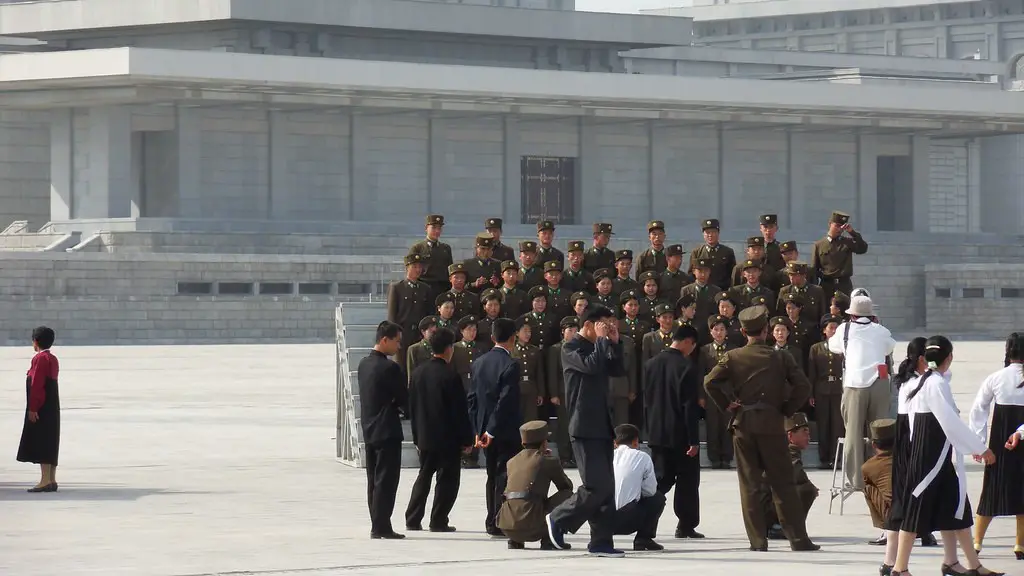Political Ideology
Both North Korea and China have been governed by authoritarian regimes since their inception, making them two of the longest-standing communist countries in the world. Both countries have adopted elements of the Maoist and Stalinist branches of communism, which emphasize central authority, militarized and combative forms of governance, a high degree of political and social control, and an ideological purity. North Korea took a more extreme approach than China, adopting a juche ideology that puts its independent and self-reliant people and their will to power at the core of its ideology. While China has become increasingly invested in the global economy, it still often behaves in an authoritarian manner and has a soft spot for Soviet-era rules and regulations.
Foreign Policy
North Korea and China have historically shared strong ties. The two have been allies since the Korean War, when China sent troops to help North Korea fend off the United Nations led by the United States. This alliance remains strong today, and has been lauded by some as the last real revolutionary internationalism in the world. Both countries also embrace a more hardline foreign policy that is often in direct opposition to the combined forces of the West. This often manifests itself in the form of unilateral sanctions, trade embargoes, and other forms of economic isolation.
National Character
In terms of national character, North Korea and China are remarkably similar. Both countries adhere to a nationalist approach to foreign policy, and both maintain a strict sense of cultural identity and collective pride. Both countries also possess incredibly powerful and influential military organizations. China boasts one of the largest and most powerful armed forces in the world, while North Korea is well-known for its secretive and highly advanced military capabilities.
Economy
Economically, North Korea and China differ greatly. North Korea has maintained a largely closed economy, while China has embraced a far more open approach. North Korea’s economy is heavily dependent on foreign trade and aid from its closest ally, China, while China’s economy operates in the world market and is highly diversified. While North Korea’s economic development has been stifled for years due to international sanctions, China has achieved remarkable economic growth and has become one of the world’s economic superpowers.
Cultural Influence
Both North Korea and China have had a significant cultural impact on the world. North Korea has achieved global notoriety for its oppressive dictatorship and its militaristic rhetoric, while China is well-known for its ancient history and its expansive empire. Both countries are also deeply rooted in East Asian culture, with both nations embracing Confucianism, Buddhism and traditional values.
Education System
The education systems of North Korea and China are also strikingly similar. Both countries favor rote and traditional learning, with a focus on memorization and conformity. Both countries also promote heavy government control in the realm of education, with mandated curriculum and strict rules. However, China has adopted a far more open-minded approach, allowing for greater creativity and a wider range of learning opportunities.
Legal System
The legal systems of North Korea and China also share a number of similarities. Both countries adhere to a civil law approach, relying on a set of codified laws as opposed to relying on common law or on the interpretation of judges. Both countries are also authoritarian in nature, with a strong emphasis on punishing and deterring criminal activity. China has, however, adopted a more modern approach to its legal system in recent years, with an increased focus on human rights and civil liberties.
Political System
The political systems of North Korea and China have also evolved in similar ways. Both countries are characterized by authoritarian regimes, and both use terror and fear to maintain order. However, China has begun to slowly transition towards a more open and democratic form of governance, while North Korea seems to be firmly entrenched in its authoritarian system.
Civil Society
North Korea and China both struggle with civil society, with both countries lacking a true freedom of expression, religion, and association. Both countries also have a history of persecuting dissidents and political activists, with North Korea going so far as to imprison or execute those who speak out against the government. China, however, has undergone sweeping reforms in recent years, allowing for a greater degree of civil liberties and freedom of expression.
Economic Situation
Although North Korea and China have very different economic situations, they still have much in common. Both countries have experienced periods of significant economic growth, as well as periods of economic decline. North Korea is largely reliant on foreign aid and restricted in its ability to trade and access the global economy, while China embraces a more open approach and takes full advantage of its position as one of the world’s largest economies.
Censorship
Both North Korea and China share a common history of censorship and control of the media. Both countries have heavily restricted access to the Internet and other forms of media, with censorship aimed at controlling what the public has access to. While China has become increasingly open in recent years, North Korea remains one of the most restricted media environments in the world.
Political Freedom
North Korea and China both lack true political freedom, with both countries lacking freedom of speech, assembly, and association. North Korea is well-known for its repression of its own people, while China has been accused of using fear to compel obedience and silence dissent. Both countries also have a history of using violence and intimidation to suppress those who speak out against their respective governments.
Economic Development
The economic development of North Korea and China has been drastically different over the last several decades. While China has embraced a market-based economy and experienced unprecedented growth, North Korea has remained largely closed off and reliant on foreign aid and state subsidies. North Korea has struggled to eliminate poverty and provide basic services to its citizens, while China has become one of the most powerful economies in the world.
Political System
North Korea and China’s political systems are based on the same principles of authoritarianism and state control. Both countries rely on a single party system that is highly centralized and hierarchical. Their respective governments prioritize the stability of the state over the interests of the citizens, ensuring that those in power maintain their grip on the government.
International Relations
North Korea and China have maintained a close relationship over the years, with both countries demonstrating their loyalty to each other numerous times. This has resulted in several regional alliances that have largely kept North Korea out of the sphere of influence of the United States and other Western countries. China’s economic and military might has served as an asset for North Korea, allowing them to avoid diplomatic isolation and maintain a steady flow of resources.
Domestic Policy
The domestic policies of North Korea and China are remarkably similar, with both countries relying on heavy state control and authoritarian rule. Both countries have a history of harshly punishing dissenters, and both countries maintain strict and relentless surveillance of their citizens. While North Korea has seen some economic reform in recent years, the country remains largely isolated from the rest of the world and largely dependent on foreign aid and assistance.
Role in the Global Community
China and North Korea have had a significant impact on the global community. North Korea serves as a constant reminder of the potential consequences of authoritarian rule, while China has demonstrated that market-oriented economies can achieve incredible levels of economic growth. Both countries have also sought to shape the global community in their own image, demonstrating the power that their respective governments have to influence international politics and shape the global order.




